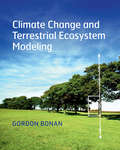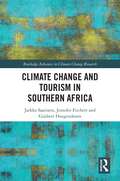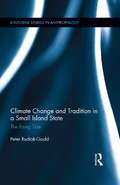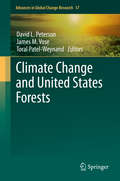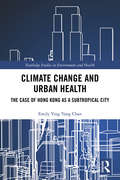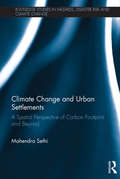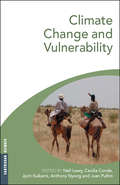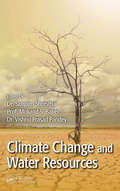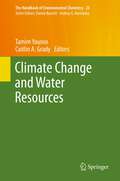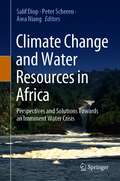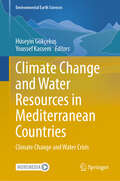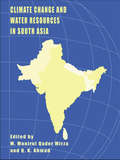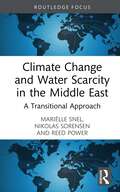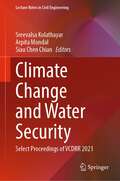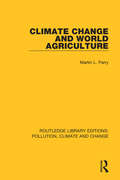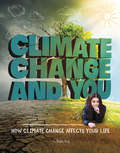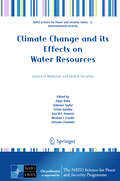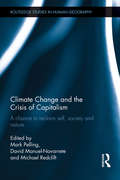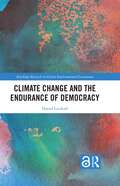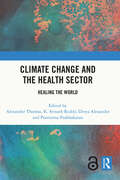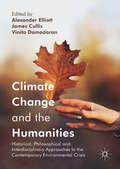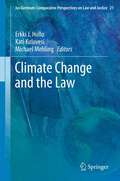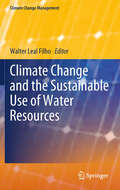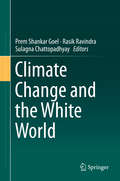- Table View
- List View
Climate Change and Terrestrial Ecosystem Modeling
by Gordon BonanClimate models have evolved into Earth system models with representation of the physics, chemistry, and biology of terrestrial ecosystems. This companion book to Gordon Bonan's Ecological Climatology: Concepts and Applications, Third Edition, builds on the concepts introduced there, and provides the mathematical foundation upon which to develop and understand ecosystem models and their relevance for these Earth system models. The book bridges the disciplinary gap among land surface models developed by atmospheric scientists; biogeochemical models, dynamic global vegetation models, and ecosystem demography models developed by ecologists; and ecohydrology models developed by hydrologists. Review questions, supplemental code, and modeling projects are provided, to aid with understanding how the equations are used. The book is an invaluable guide to climate change and terrestrial ecosystem modeling for graduate students and researchers in climate change, climatology, ecology, hydrology, biogeochemistry, meteorology, environmental science, mathematical modeling, and environmental biophysics.
Climate Change and Tourism in Southern Africa (Routledge Advances in Climate Change Research)
by Jarkko Saarinen Jennifer Fitchett Gijsbert HoogendoornThis book explores the nature of climate change in southern Africa, its impacts on tourism and the resilience, adaptation and governance needs in various tourism operations and environments. Previous studies on climate change and tourism have mainly focused on the Global North and specific forms of tourism such as snow-based winter activities. Drawing on case studies from a wide range of countries including South Africa, Lesotho, Namibia, Botswana and Zimbabwe, this book fills this lacuna by describing and analysing the climate change and tourism nexus in the southern African context. The book begins by providing an overview of the current and estimated impacts of climate change to the tourism industry in the region, highlighting the deepening socio-economic inequities, and environmental and social injustices. It focuses on the importance of sustainable tourism in tackling these issues and highlights that resilience and robust governance and policy systems are essential for a tourism destination to successfully adapt to change. By synthesising the key lessons learned through this analysis, Climate Change and Tourism in Southern Africa also draws attention to specific adaptation and policy strategies which have value for other regions in the Global South. This book will be of great interest to students and scholars of climate change, tourism and environmental policy and justice.
Climate Change and Tradition in a Small Island State: The Rising Tide (Routledge Studies in Anthropology #13)
by Peter Rudiak-GouldThe citizens of the Marshall Islands have been told that climate change will doom their country, and they have seen confirmatory omens in the land, air, and sea. This book investigates how grassroots Marshallese society has interpreted and responded to this threat as intimated by local observation, science communication, and Biblical exegesis. With grounds to dismiss or ignore the threat, Marshall Islanders have instead embraced it; with reasons to forswear guilt and responsibility, they have instead adopted in-group blame; and having been instructed that resettlement is necessary, they have vowed instead to retain the homeland. These dominant local responses can be understood as arising from a pre-existing, vigorous constellation of Marshallese ideas termed "modernity the trickster": a historically inspired narrative of self-inflicted cultural decline and seduction by Euro-American modernity. This study illuminates islander agency at the intersection of the local and the global, and suggests a theory of risk perception based on ideological commitment to narratives of historical progress and decline.
Climate Change and United States Forests (Advances in Global Change Research #57)
by Toral Patel-Weynand David L. Peterson James M. VoseThis volume offers a scientific assessment of the effects of climatic variability and change on forest resources in the United States. Derived from a report that provides technical input to the 2013 U. S. Global Change Research Program National Climate Assessment, the book serves as a framework for managing U. S. forest resources in the context of climate change. The authors focus on topics having the greatest potential to alter the structure and function of forest ecosystems, and therefore ecosystem services, by the end of the 21st century. Part I provides an environmental context for assessing the effects of climate change on forest resources, summarizing changes in environmental stressors, followed by state-of-science projections for future climatic conditions relevant to forest ecosystems. Part II offers a wide-ranging assessment of vulnerability of forest ecosystems and ecosystem services to climate change. The authors anticipate that altered disturbance regimes and stressors will have the biggest effects on forest ecosystems, causing long-term changes in forest conditions. Part III outlines responses to climate change, summarizing current status and trends in forest carbon, effects of carbon management, and carbon mitigation strategies. Adaptation strategies and a proposed framework for risk assessment, including case studies, provide a structured approach for projecting and responding to future changes in resource conditions and ecosystem services. Part IV describes how sustainable forest management, which guides activities on most public and private lands in the United States, can provide an overarching structure for mitigating and adapting to climate change.
Climate Change and Urban Health: The Case of Hong Kong as a Subtropical City (Routledge Studies in Environment and Health)
by Emily Ying ChanThis book provides a theoretical framework and related technical skills for investigating climate change and its public health consequences and responses with a focus on urban settings, and in particular Hong Kong, a subtropical metropolis in Asia. Specifically, the book examines the impact of climate change on health in terms of mortality, hospital admissions and help-seeking, as well as key response strategies of adaptation and mitigation. Many existing books tend to consider the relationship of climate change and public health as two connected issues divided into various discrete topics. Conversely, this book explicitly applies public health concepts to study the human impact of climate change, for example, by conceptualising climate change impact and its alleviation, mitigation and adaptation in a public health framework. Overall, this volume summarises what is known about climate change and health and ignites further debates in the area, especially for urban subtropical communities from within a wider global perspective. This book will be of great interest to students and scholars of environmental health, public health, climate change, urban studies and Asian studies.
Climate Change and Urban Settlements: A Spatial Perspective of Carbon Footprint and Beyond (Routledge Studies in Hazards, Disaster Risk and Climate Change)
by Mahendra SethiClimate change and urbanization are two of the greatest challenges facing humanity in the 21st century, and their effects are converging in dangerous ways. Cities contribute significantly to global warming, and as the world further takes a rural-urban population tilt, the next few decades pose a great challenge in addressing global disparities in the access and allocation of carbon. This book explores the ways in which cities, through their spatial development, contribute to greenhouse gas (GHG) emissions and looks at the ways in which rapidly urbanizing cities in low- and middle-income countries can be planned to reduce overall GHG emissions. The book considers key questions such a: What should be the appropriate economies of scale for cities in a country? What is the most favourable rate of urbanization? What should be the most suitable spatial pattern for a city? And what are appropriate regulatory, economic or governance mechanisms to achieve a low-carbon society? These issues are explored through data analysis of over 156 developing countries and through a specific case study of India. India acts as an interesting example of how societies undergoing rural-to-urban transformations could become green within the planetary boundaries while systematically addressing national and local urban governance. The research concludes with a future pathway that is committed to low-carbon and high-equity spatial development, and will find pertinence to researchers and practitioners alike. This book provides a new tool for policymakers, planners and scholars to rationally and equitably account for global carbon space, prioritize low-carbon strategies for national urbanization and planning individual cities, in addition to recommending an urban governance framework inclusive of green agenda.
Climate Change and Vulnerability (Earthscan Climate Ser.)
by Cecilia Conde Jyoti Kulkarni Neil Leary Anthony Nyong Juan Pulhin�Sound and solid case studies on vulnerability and adaptation have been woefully lacking in the international discourse on climate change. This set of books begins to bridge the gap.� Achim Steiner, UN Under-Secretary General and Executive Director of United Nations Environment Programme �Important reading for students and practitioners alike.� Martin Parry, Co-Chair, Working Group II (Impacts, Adaptation and Vulnerability), Intergovernmental Panel on Climate Change (IPCC) �This book fills an important gap in our understanding ... It is policy-relevant and deserves to be widely read.� Richard Klein, Senior Research Fellow, Stockholm Environment Institute (SEI), Sweden The award of the Nobel Peace Prize for 2007 to the IPCC brings needed attention to the threats from climate change for highly vulnerable regions of the developing world. This authoritative volume (along with its companion covering adaptation) resulting from the work of the Assessments of Impacts and Adaptations to Climate Change (AIACC) project launched with the IPCC in 2002, is the first to provide an in-depth investigation of the stakes in developing countries. It discusses who is vulnerable and the nature and causes of their vulnerability for parts of the world that have been poorly researched till now. It also provides researchers with new examples of applications of vulnerability assessment methods, an approach that is of growing interest in the climate change area but for which there are relatively few applications in the literature. Published with TWAS and START
Climate Change and Water Resources
by Sangam Shrestha Vishnu Prasad Pandey Mukand S. BabelCovering the various aspects of water and climate change, Climate Change and Water Resources presents the principles of climate change science and its effects on earth's water supply. Utilizing the knowledge and expertise from well-known experts in the field, the text provides a broad outline of the many interrelated aspects of climate variations,
Climate Change and Water Resources (The Handbook of Environmental Chemistry #25)
by Tamim Younos Caitlin A. GradyThis volume presents nine chapters prepared by international authors and highlighting various aspects of climate change and water resources. Climate change models and scenarios, particularly those related to precipitation projection, are discussed and uncertainties and data deficiencies that affect the reliability of predictions are identified. The potential impacts of climate change on water resources (including quality) and on crop production are analyzed and adaptation strategies for crop production are offered. Furthermore, case studies of climate change mitigation strategies, such as the reduction of water use and conservation measures in urban environments, are included. This book will serve as a valuable reference work for researchers and students in water and environmental sciences, as well as for governmental agencies and policy makers.
Climate Change and Water Resources in Africa: Perspectives and Solutions Towards an Imminent Water Crisis
by Salif Diop Peter Scheren Awa NiangThe focus of this book is on the key water-related vulnerabilities to climate change in Africa, particularly in its most vulnerable areas, exploring potential management responses to such vulnerabilities. The African countries are particularly exposed and vulnerable to the negative impacts of climate change, with important impacts on water resources and hydrological systems, water availability, water resource management and sea level variations. Already, under various anthropogenic pressures, the status of water resources in Africa has been changing over the past decades, with decreasing water quality, falling groundwater levels, and variability in rainfall, both in terms of timing and intensity. Climate change will further accelerate the rate of change, affecting the ability of people and societies to respond in a timely manner. It is clear that there is no quick fix to the pressures imposed on water resources by climate change. Increasing the resilience of ecosystems and communities to extreme events such as flooding and drought, and integrating climate change risks and opportunities into development decision-making is indeed a key challenge, as much a technical climate-change one, as a political and developmental challenge. The book, in this regard, intends to contribute to the debate around climate change in relation to water resources management in Africa, and in particular inform policy decisions and actions that will improve governments’ and communities’ ability to manage the challenges of climate change and variability in relation to the aquatic ecosystems that they depend on. The knowledge collected in this book will benefit policy makers, researchers, as well as other stakeholders.
Climate Change and Water Resources in Mediterranean Countries: Climate Change and Water Crisis (Environmental Earth Sciences)
by Hüseyin Gökçekuş Youssef KassemThe book provides the opportunity to connect with experts on water treatment techniques, eco-hydrology, hydro-informatics, emerging pollutants in water resources and water management from all over the world. Water is still one of the most significant problems in the world and especially in the Mediterranean region. In this thematic book, all possible approaches and suggestions aimed at finding solutions to overcome water scarcity, better alternatives to treat wastewater and ensuring access to clean water for all communities are valuable subjects that are included for directing authorities to take a step further towards overcoming water-related problems for everyone around the world.
Climate Change and Water Resources in South Asia
by M. Monirul Qader Mirza Q. K. AhmadThis book addresses the most pressing water resource issues in South Asia, particularly in relation to climate change and variability. This is a region characterised by abundant water during the monsoon, when devastating floods occur, and by scarcity of water and droughts during the dry period. These extreme events often cause substantial damage to
Climate Change and Water Scarcity in the Middle East: A Transitional Approach (Earthscan Studies in Water Resource Management)
by Mariëlle Snel Nikolas Sorensen Reed PowerAs water's significance as a geopolitical resource is poised to surpass that of oil, this book explores the adaptation of Water, Sanitation, and Hygiene (WASH) services in the Middle East to climate change challenges, leveraging the Humanitarian-Development-Peace nexus for a sustainable transition and resilient solutions. Delving into the humanitarian and development sectors across the region, the authors advocate for a transformative approach towards more innovative, integrated, and localized programming. It draws a parallel between the increasing global shift in humanitarian needs, as starkly revealed by the COVID-19 pandemic, and the ongoing devastation wrought by climate change, particularly through water-related crises such as flooding, drought, famine, and conflict. The authors stress the urgent need for adaptive and sustainable strategies that can swiftly respond to evolving climate challenges. This book argues that there is currently a window of opportunity for WASH practitioners to develop broader, multi-sectoral experiences to meet these challenges. Drawing on discussions with humanitarian and development practitioners and new contemporary case studies, this book analyzes the financial, institutional, environmental, technical, and socio-cultural considerations for creating sustainable WASH services in transition. The narrative emphasizes the urgent need for a Humanitarian-Development-Peace nexus approach, advocating for multisectoral collaboration and localization as vital to addressing protracted crises and climate change's escalating threats. It calls for a strategic shift towards organizations that merge immediate humanitarian aid with sustainable development, enhancing local capacities for effective, enduring solutions. The authors conclude by outlining practical actions for humanitarian and development organizations at the local, national, regional, and global levels to support effective integrated and transitional WASH programming in the future.
Climate Change and Water Security: Select Proceedings of VCDRR 2021 (Lecture Notes in Civil Engineering #178)
by Sreevalsa Kolathayar Siau Chen Chian Arpita MondalThis book presents the select proceedings of the Virtual Conference on Disaster Risk Reduction (VCDRR 2021). It emphasizes on the role of civil engineering for a disaster resilient society. It presents latest research on climate change and water security focusing on disaster risk reduction. Various topics covered in this book are climate change, stormwater management, flood risk analysis, drought management, water treatment, etc. This book is a comprehensive volume on disaster risk reduction (DRR) and its management for a sustainable built environment. This book is useful for the students, researchers, policy makers and professionals working in the area of civil engineering, climate change and disaster management.
Climate Change and World Agriculture
by Martin L. ParryOriginally published in 1990, this book analysed the sensitivity of the world food system and looked at the variety of ways in which it would be affected by climate change. It describes the effects of climate change on agriculture, estimates the impacts on plant and animal growth and looks at the geographical limits to different types of farming. It also considers the range of possible ways to adapt agriculture and so to mitigate the disastrous consequences of climate change.
Climate Change and You: How Climate Change Affects Your Life (Weather and Climate)
by Emily RaijWhy should you care about climate change? Weather affects your everyday life and climate change can have major impacts. Discover how scientists study climate change, what current research shows, and what you can do to reverse its effects.
Climate Change and its Effects on Water Resources: Issues of National and Global Security (NATO Science for Peace and Security Series C: Environmental Security)
by Alper Baba Antonio Chambel Gökmen Tayfur Ken W.F. Howard Michael J. Friedel Orhan GündüzNational and global security can be assessed in many ways but one underlying factor for all humanity is access to reliable sources of water for drinking, sanitation, food production and manufacturing industry. In many parts of the world, population growth and an escalating demand for water already threaten the sustainable management of available water supplies. Global warming, climate change and rising sea level are expected to intensify the resource sustainability issue in many water-stressed regions of the world by reducing the annual supply of renewable fresh water and promoting the intrusion of saline water into aquifers along sea coasts, where 50% of the global population reside. Pro-active resource management decisions are required, but such efforts would be futile unless reliable predictions can be made about the impact of the changing global conditions on the water cycle and the quality and availability of critical water reserves. Addressing this wide spectrum of issues, a team of expert authors discusses here the impacts of climate change on the global water resources, the long-term resource management goals at global and local scales, the data requirements and the scientific and technical advances necessary to mitigate the associated impacts.
Climate Change and the Course of Global History
by John L. BrookeClimate Change and the Course of Global History presents the first global study by a historian to fully integrate the earth-system approach of the new climate science with the material history of humanity. Part I argues that geological, environmental, and climatic history explain the pattern and pace of biological and human evolution. Part II explores the environmental circumstances of the rise of agriculture and the state in the Early and Mid-Holocene, and presents an analysis of human health from the Paleolithic through the rise of the state, including the Neolithic Demographic Transition. Part III introduces the problem of economic growth and examines the human condition in the Late Holocene from the Bronze Age through the Black Death, assessing the relationships among human technologies, climatic change, and epidemic disease. Part IV explores the move to modernity, stressing the emerging role of human economic and energy systems as earth-system agents in the Anthropocene. Supported by climatic, demographic, and economic data with forty-nine figures and tables custom-made for this book, A Rough Journey provides a pathbreaking model for historians of the environment, the world, and science, among many others.
Climate Change and the Crisis of Capitalism: A Chance to Reclaim, Self, Society and Nature (Routledge Studies in Human Geography)
by Mark Pelling Michael Redclift David Manuel-NavarreteAre established economic, social and political practices capable of dealing with the combined crises of climate change and the global economic system? Will falling back on the wisdoms that contributed to the crisis help us to find ways forward or simply reconfigure risk in another guise? This volume argues that the combination of global environmental change and global economic restructuring require a re-thinking of the priorities, processes and underlying values that shape contemporary development aspirations and policy. This volume brings together leading scholars to address these questions from several disciplinary perspectives: environmental sociology, human geography, international development, systems thinking, political sciences, philosophy, economics and policy/management science. The book is divided into four sections that examine contemporary development discourses and practices. It bridges geographical and disciplinary divides and includes chapters on innovative governance that confront unsustainable economic and environmental relations in both developing and developed contexts. It emphasises the ways in which dominant development paths have necessarily forced a separation of individuals from nature, but also from society and even from ‘self’. These three levels of alienation each form a thread that runs through the book. There are different levels and opportunities for a transition towards resilience, raising questions surrounding identity, governance and ecological management. This places resilience at the heart of the contemporary crisis of capitalism, and speaks to the relationship between the increasingly global forms of economic development and the difficulties in framing solutions to the environmental problems that carbon-based development brings in its wake.. Existing social science can help in not only identifying the challenges but also potential pathways for making change locally and in wider political, economic and cultural systems, but it must do so by identifying transitions out of carbon dependency and the kind of political challenges they imply for reflexive individuals and alternative community approaches to human security and wellbeing. Climate Change and the Crisis of Capitalism contains contributions from leading scholars to produce a rich and cohesive set of arguments, from a range of theoretical and empirical viewpoints. It analyses the problem of resilience under existing circumstances, but also goes beyond this to seek ways in which resilience can provide a better pathway and template for a more sustainable future. This volume will be of interest to both undergraduate and postgraduate students studying Human Geography, Environmental Policy, and Politics.
Climate Change and the Endurance of Democracy (Routledge Research in Global Environmental Governance)
by Daniel LindvallThis book explores the challenges climate change poses to the endurance of democracy, situating this theme within the context of the decline in global freedom documented since the early 21st century. It discusses how disaster events have historically affected human reasoning and agency and how the climate crisis is likely to influence democratic development in the future.Climate extreme events can provide opportunities for autocratic leaders to curtail rights and freedoms, but they can also create critical junctures where the social and political discourse within society is reshaped and where incumbent regimes are contested. The book illustrates how climate change may generate food insecurity, economic recessions and deepen socioeconomic inequalities. These effects may contribute to democratic backsliding but can also create new conditions for social mobilization. The democratic consequences of climate change are thus not primarily determined by the forces of nature, but by human responses and the social, economic and political conditions of the affected country. In the long-term perspective, however, climate change will have several negative effects on democratic stability. The book concludes that for human freedom and democracy to endure, modern society needs to be brought into balance with nature.This volume will be of great interest to students and scholars of climate governance, environmental politics, energy policy and global development.
Climate Change and the Health Sector: Healing the World
by Alexander Thomas K. Srinath Reddy Divya Alexander Poornima PrabhakaranThe health sector is known to be one of the major contributors towards the greenhouse gas emissions causing the climate crisis, the greatest health threat of the 21st century. This volume positions the health sector as a leader in the fight against climate change and explores the role of the health system in climate policy action. It delivers an overview of the linkages between climate change and the health sector, with chapters on the impact of climate change on health, its connection to pandemics, and its effects on food, nutrition and air quality, while examining gendered and other vulnerabilities. It delves into the different operational aspects of the health sector in India and details how each one can become climate-smart to reduce the health sector’s overall carbon footprint, by looking at sustainable procurement, green and resilient healthcare infrastructure, and the management of transportation, energy, water, waste, chemicals, pharmaceuticals and plastics in healthcare. Well supplemented with rigorous case studies, the book will be indispensable for students, teachers, and researchers of environmental studies, health sciences, and climate change. It will be useful for healthcare workers, public health officials, healthcare leaders, policy planners, and those interested in climate resilience and preparedness in the healthcare sector.
Climate Change and the Humanities: Historical, Philosophical and Interdisciplinary Approaches to the Contemporary Environmental Crisis
by Vinita Damodaran Alexander Elliott James CullisThis volume of essays fills a lacunae in the current climate change debate by bringing new perspectives on the role of humanities scholars within this debate. The humanities have historically played an important role in the various debates on environment, climate and society. The past two decades especially have seen a resurfacing of these environmental concerns across humanities disciplines in the wake of what has been termed climate change. This book argues that these disciplines should be more confident and vocal in responding to climate change while questioning the way in which the climate change debate is currently being conducted in academic, political and social arenas. Addressing climate change through the varied approaches of the humanities means re-thinking and re-evaluating its fundamental assumptions and responses to perceived crisis through the lens of history, philosophy and literature. The volume aims thus to be a catalyst for emerging scholarship in this field and to appeal to an academic and popular readership.
Climate Change and the Law (Ius Gentium: Comparative Perspectives on Law and Justice #21)
by Michael Mehling Kati Kulovesi Erkki J. HolloClimate Change and the Law is the first scholarly effort to systematically address doctrinal issues related to climate law as an emergent legal discipline. It assembles some of the most recognized experts in the field to identify relevant trends and common themes from a variety of geographic and professional perspectives. In a remarkably short time span, climate change has become deeply embedded in important areas of the law. As a global challenge calling for collective action, climate change has elicited substantial rulemaking at the international plane, percolating through the broader legal system to the regional, national and local levels. More than other areas of law, the normative and practical framework dedicated to climate change has embraced new instruments and softened traditional boundaries between formal and informal, public and private, substantive and procedural; so ubiquitous is the reach of relevant rules nowadays that scholars routinely devote attention to the intersection of climate change and more established fields of legal study, such as international trade law. Climate Change and the Law explores the rich diversity of international, regional, national, sub-national and transnational legal responses to climate change. Is climate law emerging as a new legal discipline? If so, what shared objectives and concepts define it? How does climate law relate to other areas of law? Such questions lie at the heart of this new book, whose thirty chapters cover doctrinal questions as well as a range of thematic and regional case studies. As Christiana Figueres, Executive Secretary of the United Nations Framework Convention on Climate Change (UNFCCC), states in her preface, these chapters collectively provide a "review of the emergence of a new discipline, its core principles and legal techniques, and its relationship and potential interaction with other disciplines."
Climate Change and the Sustainable Use of Water Resources (Climate Change Management)
by Walter Leal FilhoThe book explores the geo-chemical, physical, social and economic impacts of climate change on water supplies. It contains examples and case studies from a wide range of countries, and addresses the need to promote sustainable water use across the world.
Climate Change and the White World
by Rasik Ravindra Prem Shankar Goel Sulagna ChattopadhyayThis book showcases the results of studies pertaining to climate changes in the Polar Regions - Arctic-Antarctic-Himalaya. It discusses the significant variations due to thinning of sea ice in the Arctic, insights on the first Indian Arctic multi-sensor mooring (IndARC), political context of major geological and tectonic features of Arctic Ocean, climate change and its predicted impacts on fisheries and coastal communities. The book also contains the work pursued under the National Mission for Sustaining the Himalayan Ecosystems, aiming towards strengthening the capacities of farmers through appropriate Lab-to-Land intervention to combat climate change issues. Discussions on various models like WRF (Weather Research and Forecasting), Regional Climate Model (RegCM4) pertaining to Himalaya have been highlighted to gain more insights on climate change.
